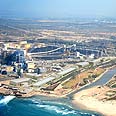State Comptroller’s Report for 2012 criticizes government, officials for delays, irregularities in implementation of water desalination program
The State Comptroller’s Report for 2012 which was released on Tuesday revealed that delays in the erection of desalination plants are continuing. The report’s severe criticism of the desalination efforts is a continuation of the comptroller’s criticism in previous reports.

A Desalination plant
The government, notes State Comptroller Micha Lindenstrauss, committed to establishing desalination plants that would by 2013, produce 600 million cubic meters of water per year. Yet so far the plants have only managed to produce 300 million cubic meters.
“This is an ongoing governmental failure that impedes the public interest,” the report determined.
“The Finance and Infrastructure Ministries and the Water Authority together with Mekorot, the national water company, have not done enough to ensure that the required amounts of water be desalinized for the earliest possible need,” the comptroller added.
“We take seriously the fact that in spite of previous criticism from a national commission of inquiry, insufficient steps have been taken (on the matter).
“This is an essential and existential product where failure to address (the issue) in a timely matter could cause massive direct and indirect damages to the economy, the environment and the State’s populace.”
The comptroller also criticized the facility construction tenders. “One private entrepreneur is a partner in three out of five of the desalination plants…70% of the water set to be desalinized in Israel.
The entrepreneur (in question) is also the owner of a gas supply company (Delek) and power stations that provide energy for the desalination plants. Creating concerns for a possible unwanted monopoly and the expansion of centralization in the market.”
The comptroller further notes that “the private entrepreneur holds a major stake in the market which creates a situation whereby the State is dependent and raises concerns of cross subsidization between his companies and the influence on prices.”
The Anti-Trust Authority said in response that the ownership does not raise concerns of possible impact on the public.
View Source
By Tani Goldstein







 Israeli New Shekel Exchange Rate
Israeli New Shekel Exchange Rate